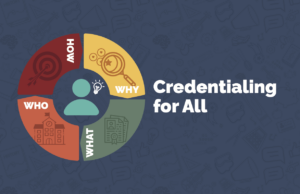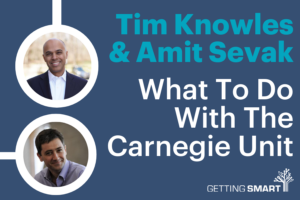Skills Transcripts at Scale: Why The ETS & MTC Partnership is a Big Deal
Key Points
-
One of the core problems is that education is based on time rather than learning.
-
We finally have a chance to move courses and grades into the background and foreground powerful personalized learning experiences and capture and communicate the resulting capabilities in much more descriptive ways—and do it at scale

We’re a step closer to skills transcripts for all learners today. Better yet, we’re a step closer to moving courses and grades into the background and helping all learners tell their story and express their capabilities.
Today, ETS announced that MTC will become a subsidiary. It’s a big deal—not financially, but because it brings together key infrastructure components for the future of learning.
Mastery Transcript Consortium (where I am a Director) is a national nonprofit membership organization that provides a mastery transcript that replaces traditional high school transcripts. Instead of a list of courses and grades, learners share competencies with colleges and employers. This spring, over 500 colleges accepted learners applying with the Mastery Transcript or Mastery Record.
Nonprofit ETS is a global education and talent solutions organization. Their innovative assessment solutions help 50 million people each year to clarify their strengths and find opportunities for growth in education, work and beyond. They operate around the world with operations in 200 countries and territories.

A year ago, the Carnegie Foundation and ETS announced a new partnership designed to transform assessment by creating a robust, scalable suite of assessment and analytic tools that captures the full range of skills required for American students to succeed in K–12, postsecondary education and beyond. ETS described A New Vision for Skills-Based Assessment.
What’s the Problem?
One of the core problems is that education is based on time rather than learning. Tim Knowles explains:
“In 1906, when the Carnegie Foundation created the Carnegie Unit, it suggested that a college degree should be 120 credits. Today, it’s 120 credits. It’s become the bedrock currency of the educational economy. It’s infiltrated everything. It’s how we organize high schools and universities and how we think about assessment, it’s instrumental to accreditation, to who gets financial aid and who doesn’t. It defines the daily work of teachers and professors. It is the system.”
More on the problem with courses and grades:
- Diplomas and grades have lost currency as signaling devices
- A list of required time-based courses is a weak and inconsistent way to organize skill priorities
- Courses silo learning by discipline and stifle innovative and equitable learning experiences
- Grades are a mushy inflated signal and lousy extrinsic motivator
At ASU-GSV, Tim Knowles and XQ’s Russlyn Ali outlined the pillars of the new architecture:
- New goals for what students should know and be able to do. (our XQ Learner Outcomes below)
- New learning experiences that transform what teaching and learning look and feel like
- New signals and indicators of success about how students are doing and how adults and the system must adapt to serve them
- All with catalyzing forces underneath with unprecedented coordination among them, like supportive policies, smart infrastructure, and intuitive technology like AI
The ETS and MTC partnership is a big advance in goals and signals. New learning goals—what ETS calls Skills for the Future—will be assessed in accurate, authentic and dynamic ways yielding new signals—skill credentials shared through portable learner records.
We finally have a chance to move courses and grades into the background and foreground powerful personalized learning experiences and capture and communicate the resulting capabilities in much more descriptive ways—and do it at scale.
For more, check out the conversation below where we talked with Tim Knowles and Amit Sevak about ETS, collaboration and the Carnegie Unit.







0 Comments
Leave a Comment
Your email address will not be published. All fields are required.